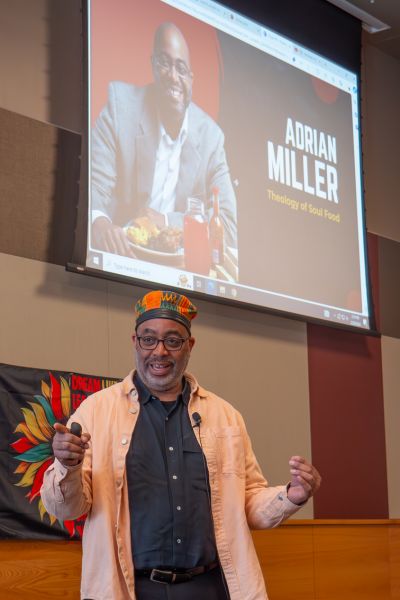James Beard Award winner gives Regis a taste of soul food and its history
James Beard Award-winning food writer Adrian Miller gave Regis a taste of soul food — and a healthy serving of history — in an interactive presentation hosted in February as part of the University’s lineup of Black History Month events.
Miller, a Denver-based attorney, certified barbecue judge and expert on soul food, is the author of three books: Soul Food: The Surprising Story of an American Cuisine One Plate at a Time; The President’s Kitchen Cabinet and Black Smoke: African Americans and the United States of Barbecue. His first and third books won the James Beard Foundation Book Award for Scholarship and Reference.
During the presentation, Miller, who offered attendees a taste of soul food spices, from Black River Creole to peach cobbler seasoning to Old Bay, walked the audience through the cuisine’s West African roots and development in the American South.
Miller said he considers soul food to be a British meal with West African influences because of the combination of the colonizing forces of the British and the traditions people who were enslaved brought from Africa to the United States. Enslaved people of African heritage who lived in the Caribbean, Central America or South America had more autonomy over their food, Miller said, so food in those places is more closely related to African food. This was not the case for enslaved people in the United States, who were allotted only ingredients such as starches including rice, corn meal, and sweet potatoes, and meat, such as pork, and a jug of molasses.
After generations of evolution, Miller said soul food consists of items such as the variety of spices he shared with the audience, hot sauce, fried chicken, chitlins (hog guts), dark leafy greens, such as cabbage, kale, mustard, turnip and collard greens, black eyed peas, candied yams, macaroni and cheese, red Kool-Aid, sweet tea, wheat breads, corn bread, cobbler and banana pudding.
Miller, often called the Soul Food Scholar, said his expertise in the cuisine started after he read journalist John Egerton’s Southern Food: At Home, on the Road, in History in 2001. The book, published in 1987, proclaimed that “the tribute to Black achievement in American cookery has yet to be written.” As he read that line 14 years later, Miller figured that, by then, someone would have written it. But he was curious. So, he wrote Egerton to ask him.
“And he said, ‘You know, for the most part, nobody's taken on the full story. There's always room for another voice, so why not yours?’ So, with no qualifications at all, except for eating a lot of soul food, and cooking it some, that's what started the journey,” Miller said.
A graduate student at the time, Miller spent his weekends and hours after school and work visiting the Denver Public Library to read about the history of Black food. As part of his research, he read 3,500 oral histories of formerly enslaved people, looking for specific mentions of food. He read 500 cookbooks and thousands of newspaper articles. He also talked to cooks across the country. His research didn’t stop there: Miller visited 150 soul food restaurants in 35 cities and 15 states.
The result of his research was his first book, which creates a representative soul food meal. Each chapter breaks down every part of the meal, explaining what it is, how it made its way to the soul food plate, and what it means for Black culture.
“When I first started this journey … I didn't even think I was going to have enough information to write one book. And I quickly had enough to write several.”
And that he did.
His next book, The President’s Kitchen Cabinet, covered Black chefs and cooks who cooked for American presidents. A Black chef has cooked for every president from George Washington to Joe Biden, Miller said, making his research a compelling task. In Black Smoke: African Americans and the United States of Barbecue, Miller wrote about the significant contributions of African Americans in the development of barbecue.
Learn more about how Regis is honoring Black History Month.
